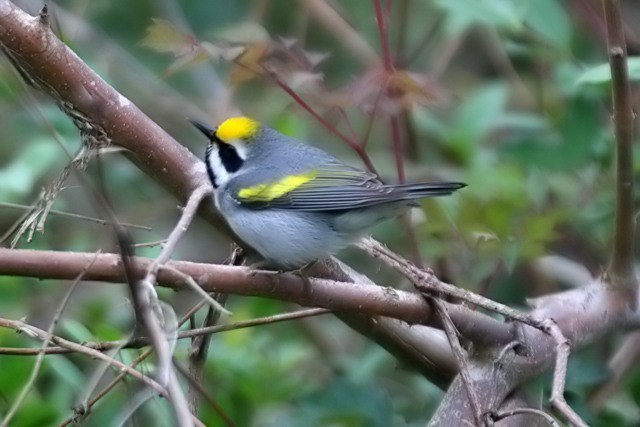Golden-winged Warblers in America 'knew' in advance that a massive 'supercell' storm was coming last spring, according to researchers.
The birds left the scene well before devastating supercell storms blew in, apparently predicting the danger of the storm, which spawned 84 confirmed tornadoes and killed at least 35 people.
The discovery was made by accident while researchers in the Cumberland Mountains of eastern Tennessee were testing whether the warblers were able to carry geolocators on their backs. As the big storm was brewing, the birds took off from their breeding grounds — having only just arrived — and travelled 930 miles in five days to avoid the extreme weather.

Golden-winged Warbler (Photo: Stuart Elsom)
"The most curious finding is that the birds left long before the storm arrived," says Henry Streby of the University of California, Berkeley. "At the same time that meteorologists on The Weather Channel were telling us this storm was headed in our direction, the birds were apparently already packing their bags and evacuating the area."
The birds fled more than 24 hours before the arrival of the storm, Streby and his colleagues reported. The researchers suspect that the birds did it by hearing infrasound associated with the severe weather, at levels well below the range of human hearing. "Meteorologists and physicists have known for decades that 'tornadic' storms make very strong infrasound that can travel thousands of miles," Streby explained. While the birds might pick up on some other cue, the infrasound from severe storms happens to travel at exactly the same frequency the birds are most sensitive to hearing.
The findings show that birds that follow annual migratory routes can also take off on unplanned trips at other times of the year, when conditions require. As climate change is expected to produce storms that are both stronger and more frequent, this is a good adaptation as far as the birds are concerned.
However, the researchers say there is also a downside. "Our observations suggest [that] birds aren't just going to sit there and take it with regards to climate change, and maybe will fare better than some have predicted," Streby says. "On the other hand, this behaviour presumably costs the birds some serious energy and time they should be spending on reproducing." The birds' energy-draining journey is just one more pressure human activities are putting on migratory songbirds.
In the coming year, Streby's team will deploy hundreds of geolocators on Golden-winged Warblers and other species across their entire breeding range, to find out where they spend the winter and how they get there and back.
"I can't say I'm hoping for another severe tornado outbreak," Streby says, "but I am eager to see what unpredictable things happen this time."


